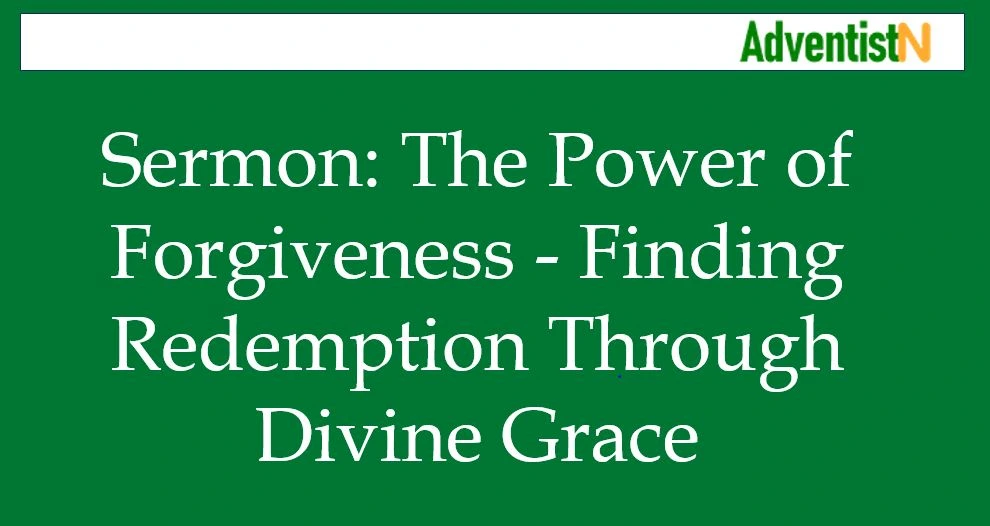
Introduction
Greetings, beloved congregation. Today, we gather to explore a topic of profound significance – the power of forgiveness. Forgiveness is a concept deeply embedded in the teachings of our faith, and it holds the potential to transform lives, heal wounds, and reconcile relationships. As we delve into the Scriptures and reflect on the divine example of forgiveness, we will uncover the transformative power it carries and how it aligns with the core principles of our Christian faith.
Understanding Forgiveness: A Biblical Perspective
To truly grasp the depth of forgiveness, we turn to the pages of the Bible, where forgiveness is a central theme. In Colossians 3:13, the Apostle Paul writes, “Bear with each other and forgive one another if any of you has a grievance against someone. Forgive as the Lord forgave you.” Here, forgiveness is not just a suggestion; it’s a command rooted in the example of our Lord.
The Divine Model of Forgiveness
At the heart of forgiveness is the divine model set forth by Jesus Christ himself. In Luke 23:34, as Jesus hung on the cross, enduring immense suffering, he uttered these words: “Father, forgive them, for they do not know what they are doing.” This moment encapsulates the epitome of forgiveness – extending grace even in the face of betrayal, pain, and injustice. Jesus, the embodiment of divine love and mercy, showed us that forgiveness is not about condoning wrongs but about offering a path to redemption and healing.
The Transformative Power of Forgiveness
- Healing Hearts: Forgiveness possesses the remarkable power to heal wounded hearts. When we carry the weight of anger and resentment, it harms our emotional and spiritual well-being. By choosing to forgive, we release these burdens and invite healing into our lives.
- Restoring Relationships: Forgiveness is a bridge to restored relationships. Matthew 5:23-24 reminds us that before presenting our offerings to God, we should first be reconciled with our brother or sister. Forgiveness paves the way for reconciliation, fostering unity and love.
- Breaking Chains of Negativity: Holding onto grudges perpetuates negativity within our hearts and relationships. Ephesians 4:31-32 urges us to “get rid of all bitterness, rage, and anger.” Forgiveness breaks these chains, liberating us from the cycle of hurt.
- Embracing Redemption: Through forgiveness, we align ourselves with the redemption narrative woven throughout the Bible. Just as God forgives us through the sacrifice of Christ, we are called to forgive others, allowing them the opportunity for transformation and renewal.
Challenges on the Path of Forgiveness
While forgiveness holds immense power, it’s not always an easy journey. Acknowledging the challenges can help us navigate this path:
- Emotional Struggles: Letting go of resentment can be emotionally demanding, especially in the face of deep wounds. However, Psalm 147:3 reminds us that God “heals the brokenhearted and binds up their wounds.”
- Misunderstandings: Forgiveness is often misunderstood as excusing the offense. Remember that forgiveness is about healing, not minimizing the wrongs committed.
- Ego and Pride: Our ego and pride can hinder us from extending forgiveness. Yet, humility, as emphasized in Philippians 2:3, is the foundation for authentic Christian living.
- Fear of Vulnerability: Forgiveness requires vulnerability, which can be intimidating. However, 2 Corinthians 12:9 reminds us that Christ’s power is made perfect in weakness.
Steps Toward Forgiveness
- Recognize the Pain: Begin by acknowledging the pain caused by the offense. Ignoring it delays the healing process.
- Remember God’s Forgiveness: Reflect on God’s forgiveness toward us. Ephesians 4:32 encourages us to forgive others “just as in Christ God forgave you.”
- Prayer and Reflection: Seek God’s guidance through prayer and meditation. Ask for strength to follow the divine example of forgiveness.
- Choose Forgiveness: Forgiveness is a conscious choice, not a feeling. Choose to release negative emotions and open your heart to healing.
- Extend Forgiveness: If possible, communicate your decision to forgive to the person who wronged you. This step can facilitate healing and reconciliation.
Conclusion
As we conclude, remember that forgiveness is not just a human endeavor but a divine command. Through the sacrifice of Jesus Christ, we are offered the ultimate example of forgiveness. By embracing forgiveness, we align ourselves with the redemptive narrative of our faith, allowing grace to transform hearts and relationships.
Let us heed the words of Ephesians 4:31-32: “Get rid of all bitterness, rage, and anger, brawling and slander, along with every form of malice. Be kind and compassionate to one another, forgiving each other, just as in Christ God forgave you.”
May we leave this place inspired to forgive as Christ forgave us, nurturing a spirit of healing, reconciliation, and love. Let us remember that forgiveness is a gift we give not only to others but to ourselves – a gift that echoes the divine grace extended to us.
The Power of Forgiveness
Read Also: Sermon: Finding Hope in Difficult Times

